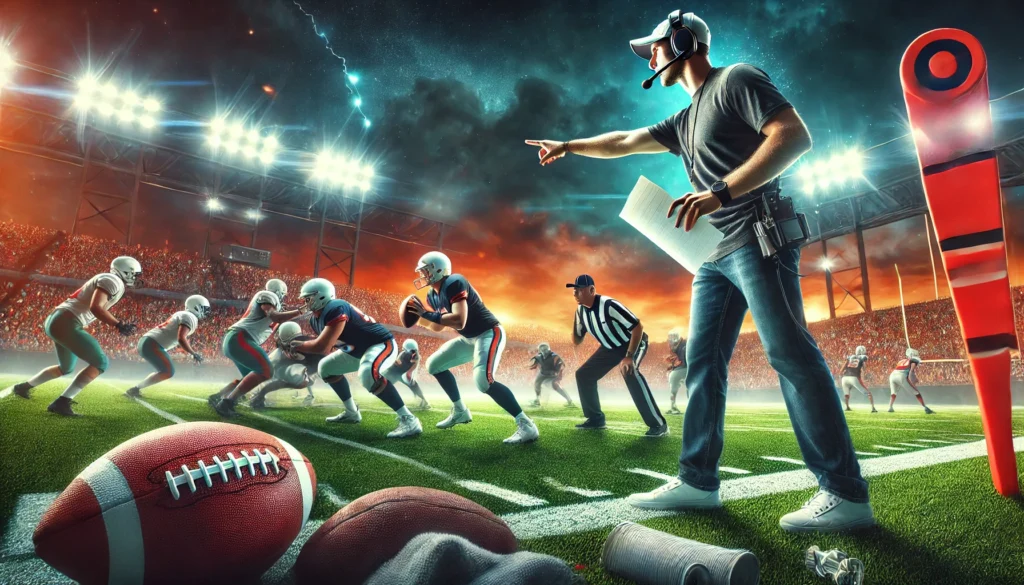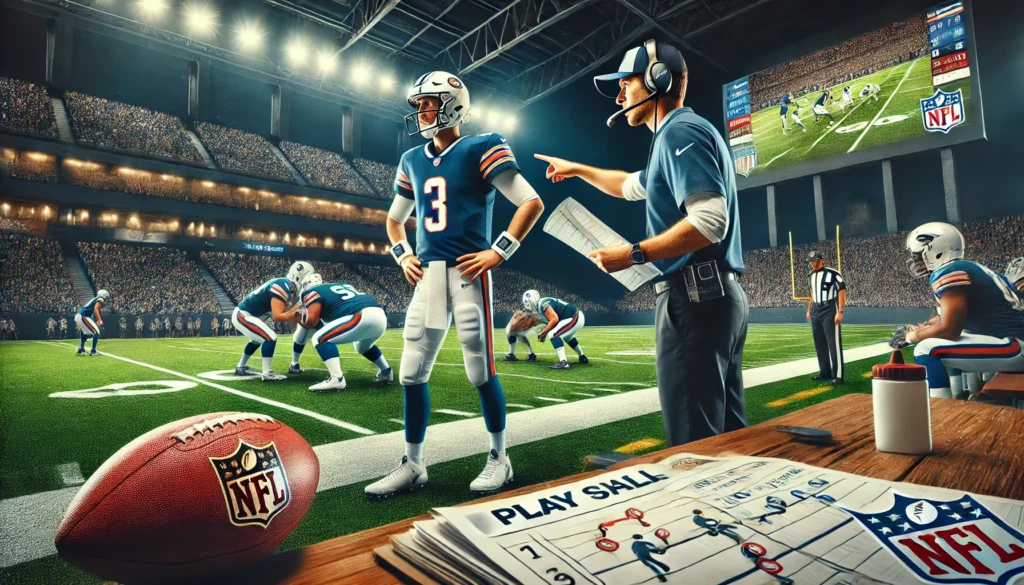If you love watching NFL games like I do, you might have wondered who’s making the decisions during the game. We see coaches talking into headsets and quarterbacks shouting instructions, but who is really calling the shots?
Let’s explore who calls the plays in the NFL and how it all works.
Coaches or Quarterbacks: Who Makes the Calls?

At first, I thought the head coach was in charge of all the plays. But that’s not always true. In the NFL, different people can call the plays, depending on the team and situation. The people most involved in play-calling are:
- Head Coach
- Offensive Coordinator
- Defensive Coordinator
- Quarterback
Let’s look at how each one plays a role.
The Head Coach’s Role
In some NFL teams, the head coach is the one calling the plays. These coaches usually have a lot of experience and like to keep control over what happens during the game. Famous head coaches like Andy Reid and Sean McVay are known for calling plays for their teams.
When the head coach calls plays, they talk directly to the quarterback or a leader on defense through a headset. This approach works well when the coach knows the game inside and out, both their team’s strengths and the opponent’s weaknesses.
But not all head coaches call the plays. Some let their coordinators handle it, so they can focus on the bigger picture, like managing the clock and other important decisions.
Offensive Coordinators: The Play Planners
The offensive coordinator is often the one who designs and calls the plays for the team’s offense. These are the coaches who come up with the strategies to score points. If you’ve ever seen a team that has creative and exciting plays, chances are the offensive coordinator is behind it.
Coaches like Eric Bieniemy and Kellen Moore are known for creating smart offensive plans. They spend a lot of time watching game footage and figuring out the best plays to use against different defenses.
One of the most interesting things about offensive coordinators is how they can change the game plan during the game. If the defense is doing something unexpected, a good offensive coordinator will adjust the plays to take advantage of any weaknesses.
Quarterbacks and Audibles
While the coach or offensive coordinator usually calls the plays, the quarterback has an important role too. Quarterbacks are responsible for running the plays on the field. Sometimes, they also have to change the play if they see something different in the defense. This is called an audible.
For example, quarterbacks like Peyton Manning were famous for making audibles at the line of scrimmage. Manning would often change the play after seeing how the defense was lined up. Tom Brady and Aaron Rodgers are also very good at reading defenses and making smart decisions.
Also Read: TicketSpread.Com – Your One-Stop Solution for Event Tickets in 2025!
Defensive Coordinators: Controlling the Defense
While the offensive coordinator handles the offense, the defensive coordinator is in charge of the defense. They decide what defensive plays to use, like whether to blitz or play zone coverage. Just like offensive coordinators, they need to adjust their plans during the game to keep up with the offense.
Some defensive coordinators are great at confusing quarterbacks by disguising their defensive strategies. Bill Belichick, for example, is known for creating complex defensive schemes that are hard to predict.
Using Analytics in Play Calling
In recent years, analytics have become a big part of play-calling. Teams now use data to make smarter decisions, like when to go for it on fourth down or whether to try a two-point conversion. Teams like the Baltimore Ravens and Cleveland Browns use a lot of analytics to guide their decisions.
I think it’s exciting how teams now use numbers and data to make better decisions. It’s leading to more aggressive plays, and I’ve noticed teams are taking more risks on the field.
Play Calling in Tough Moments
Calling plays when the game is close is different from calling plays in the first quarter. In high-pressure situations, play-calling can decide who wins or loses. Coaches and quarterbacks have to make sure they are making the best decisions, especially when the clock is running out or when they’re close to the goal line.
During these moments, you’ll often see the head coach and coordinators working together. They’ll take timeouts to discuss the next play or make last-minute changes at the line of scrimmage.
So, Who Calls the Plays?
So, who really calls the plays in the NFL? The truth is, it depends on the team. Sometimes, it’s the head coach. Other times, it’s the offensive or defensive coordinator. And don’t forget the quarterback, who has the power to change the play at the last second with an audible. Play-calling is one of the most important parts of football. Every decision made can impact the outcome of the game. Whether it’s based on experience, data, or instinct, calling the right play at the right time can make all the difference.
FAQ’s
1. Who usually calls the plays in the NFL?
In the NFL, plays are usually called by the head coach, offensive coordinator, or defensive coordinator, depending on the team.
2. Do quarterbacks call the plays in NFL games?
Quarterbacks don’t usually call the plays but can make audibles at the line of scrimmage to change plays based on what they see from the defense.
3. What is an audible in the NFL?
An audible is when the quarterback changes the play right before the snap, based on how the defense is set up.
4. How do NFL teams use analytics in play-calling?
Many NFL teams use analytics to make smarter decisions, like when to go for it on fourth down or attempt a two-point conversion.
5. Do all NFL head coaches call plays?
No, not all head coaches call plays. Some let their coordinators handle the play-calling so they can focus on overall game management.
6. What is the role of the offensive coordinator?
The offensive coordinator designs the team’s offensive strategy and often calls the plays during the game to guide the offense.
Conclusion
In conclusion, play-calling in the NFL varies from team to team. It can be managed by the head coach, offensive or defensive coordinator, and sometimes influenced by the quarterback through audibles. The right decisions made at the right time, often with the help of analytics, can greatly impact the outcome of the game.



